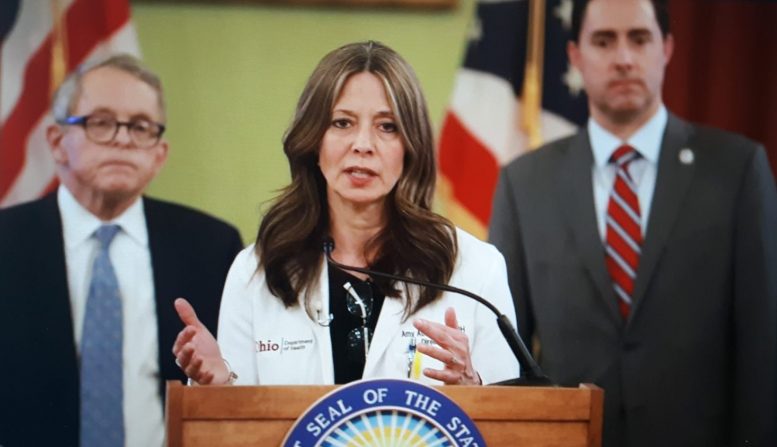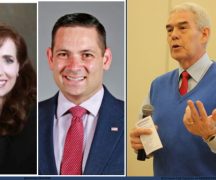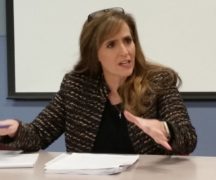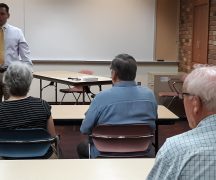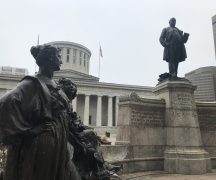By JAN LARSON McLAUGHLIN
BG Independent News
To some, Dr. Amy Acton is the public health architect of the pandemic plan that has kept Ohio’s coronavirus death rate so low.
To others, Acton has gone too far in ordering businesses closed – usurping power from elected state legislators.
The Ohio House voted Wednesday to restrict her authority and regain the balance of power in state government, according to Wood County’s state representative, Haraz Ghanbari, R-Perrysburg.
Republicans passed an amendment that would limit health department orders to 14 days. Another amendment would allow an order to be extended only if it received approval from the Joint Committee on Agency Rule Review, made up of 10 state legislators.
Gov. Mike DeWine has vowed to veto the House’s action.
Ghanbari voted in favor of curtailing Acton’s power.
“This vote was part of the solution to make sure there are checks and balances,” he said.
Acton’s steady, reassuring approach has been praised nationwide. But House Republicans believe her methods aren’t moving fast enough to get Ohio open again.
Ghanbari said Acton’s authority comes from outdated legislation passed in 1908. He believes that elected state legislators are better suited to speak for constituents about the long-reaching decisions that the public health leader has been issuing.
“We want to make sure the voices of those who we represent are heard,” he said. “I’m best positioned as a representative to be able to provide the feedback on how this is impacting Wood County.”
Ghanbari pointed at Acton’s “middle of the night” order to halt the primary election in March. “She shut the polling locations down,” he said.
That was the first of Acton’s decisions to prevent the spread of the virus that did not sit well with many House Republicans. Ghanbari said the amendment giving Acton’s future orders 14 days before they could be shut down was actually a compromise in the House.
“I had several colleagues who wanted to remove all authority from Dr. Acton,” he said.
Ghanbari said his vote was based on feedback he had received from his constituents in Wood County – many of them small business owners who are at risk of losing their livelihoods.
“They have put their entire life savings into their businesses,” he said.
State Sen. Theresa Gavarone, R-Bowling Green, said she doesn’t know how she will vote on the bill when it returns to the senate.
“I would want to look at the language,” she said.
Gavarone, who is aware of the concerns by business owners, is one of five state senators on the JCARR body, that under the new legislation would have the authority to overrule Acton’s orders.
“I’m certainly looking at everything that is happening. I’m a business owner myself,” said Gavarone who owns the Bowling Green restaurant Mr. Spots.
Gavarone and Ghanbari have both worked closely with Wood County Health Commissioner Ben Batey during the pandemic.
“I’ve been in communication with Ben Batey quite a bit. I certainly value his expertise,” Gavarone said.
But neither consulted Batey about limiting the powers of Acton.
“I have a pretty good handle on Ben’s thought process on that,” Ghanbari said.
But Batey expressed a different perspective.
“It sends a message to the public that it isn’t that important,” if public health orders can be overridden by legislators, Batey said. “We’ve proven we can control the numbers. Obviously with more cases, comes more death.”
A slow and purposeful reopening is necessary, Batey said. There are reasons why some businesses are still waiting to open. There are reasons why people are being asked to wear masks to protect others.
“Let’s stay the course with this,” Batey said. “We’ve invested so much into this path. Otherwise we could erase a lot of the work and hardship that families have gone through.”
But Ghanbari sees it differently.
While the initial stay-at-home and business closure orders may have helped flatten the curve of coronavirus cases in Ohio – those orders have now gone too far, according to Ghanbari. And those getting hurt are small businesses that have lost customers to big box stores which were allowed to stay open because they also sold groceries or other “essential” items.
Ghanbari talked about a dog groomer in Northwood, who told him she had lost many customers to PetSmart. “The big businesses are getting bigger,” while the small ones are struggling, he said.
“They also have their rights,” he said.
Ghanbari said he does not subscribe to the designations of “essential” and “non-essential” businesses.
“Who’s going to define essential and non-essential?” he asked. “To the family owning a business, it’s essential.”
Batey agreed that the terminology was difficult – and sometimes benefited larger businesses.
“That was always a challenge,” he said. “The larger the business, the more chance they had something that was essential,” allowing them to stay open. But in the case of dog groomers, Wood County Health Department did not allow big box stores to continue those operations.
“I see both sides. I feel for these families who are tied to these businesses,” Batey said. “I don’t believe it’s government’s role to put people out of business.”
But it is public health’s role to look out for the greater good and prevent death and sickness when possible. And those officials are better equipped to make those decisions.
“The people in the state making these decisions work in this world,” Batey said of public health officials. “They are consulting some of the best minds across the country.”
Batey said the resolve by DeWine and Acton has allowed Ohio to weather the pandemic with relatively few deaths and illnesses from the virus.
“I absolutely do believe that,” Batey said. “When I look at our numbers in comparison to Michigan and Pennsylvania, we’re less than half.”
“Some people may have thought that was going too far,” he said. “I do want families to get back to work – but I don’t want our health care system overwhelmed.”
But Ghanbari said people don’t need to be mandated on how to stay safe.
“I trust Ohioans to make the right decisions,” he said. “If someone doesn’t feel safe going out, they have the right to stay home.”
Gavarone said she prefers a cautious approach.
“As businesses reopen, we need to do it in a safe way,” she said. “The last thing we want to see is Ohio becoming the next hot spot.”
“I’m not a medical professional. But I would like to see continued conversations on opening the economy in a way that’s responsible – so we don’t see any further shutdowns,” Gavarone said.
Ghanbari doesn’t believe limiting Acton’s powers would insert politics into public health decisions.
“I don’t think these are going to be politically based,” he said.
“If you look beyond the actual politics, this is good legislation,” Ghanbari said of Wednesday’s vote.
According to Ghanbari, state legislators have been frustrated by not being consulted in the public health decisions.
“A lot of the feedback, as a whole, has been ignored,” he said.
Ghanbari also had concerns about the state’s orders stepping on free speech and the right to protest. He said he received a call from an organizer of the Free Ohio Now rally planned for Perrysburg, who said the group was denied a permit for holding a rally.
“These orders can’t infringe on First Amendment rights,” Ghanbari said.
However, Ghanbari reached out to the governor, who made it clear that the state orders do not restrict free speech.

